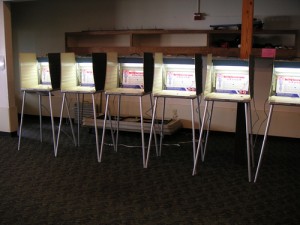What Are We to Make of This Election?
 Specifically, as far as the Latino community is concerned, we’ve yet to know. Oh, we can speculate, but what good is that?
Specifically, as far as the Latino community is concerned, we’ve yet to know. Oh, we can speculate, but what good is that?
We can infer, by polls done and talked about, that Latinos didn’t go to the polls as much as they could have or should have. We could imagine, correctly, maybe, that Latinos made up a large part of the gap in the progressive’s enthusiasm chasm. But we won’t know until exit polls are crunched and aired. And even then, I’m skeptical. See, I’m not a big fan of the usual pronouncements about the Latino vote. The people who make them usually speak of Latino voters as an aside. They’ll cull those polled that self-identify as Latino and draw their conclusions from that. Those results are serendipitous at best. And methodology matters.
On the other hand, there’s no mistaking what happened. Change happened, again. And there’s nothing more certain than that.
It happened in 2008; before that in 2006; before that in…well, you get the pattern.
I’m not making light of the Republican wave, I’m trying to understand the larger picture. It seems to me that American voters are hampered by their short-term expectations. It’s not that we’re finicky, or have short attention spans, I think there’s something else at play here.
In technology there’s Moore’s Law, which states “The number of transistors incorporated in a chip will approximately double every 24 months.” That’s why your computer seems old after 18 months. Almost as soon as you learn how to use your gadget there’s a new one with more memory and capacity. I think there’s a political corollary: a Moore’s law of politics, on a national level. And technology has a lot to do with it.
The poor bums don’t have time to settle in their seats before the voters throw them out.
It all started with the 2000 election. Remember that? I Google’d it for you in case you don’t remember. Anyway, we came out of that process a deeply divided electorate, and we’ve yet to recover. That election legitimized the extremes of both political parties and we’ve been flip-flopping ever since.
To wit: more than 75 percent of Americans say they’re dissatisfied with the general direction that the country is going. But more than 75 percent also say they’re satisfied with the direction of their lives, personal economies, etc…
Add to that the speed at which messages spread across the electorate through social media and the rate of change intensifies.
Here’s the thing to worry about, if information spreads at lightening speed, so then does misinformation. And if we believe the folks who study these things and tell us that we tend to form on line communities with people who think like us and are most like us, you can infer the outcome.
A word of warning to the victorious Republicans: two years is a complete political cycle, don’t get too comfy in your seats. I don’t say this because they’re Republicans; I say it because politicos, in general, haven’t figured out Moore’s political corollary.
A word of well intended advice: govern for the long term, but communicate the short term. That would have served Pres. Obama and his party well. It makes folks feel involved, part of the process.
The interesting thing about the Latino vote in particular is that Latino voters sat this one out. They didn’t rage against the bureaucracy. They didn’t revolt or change their minds.
They expected more and when they didn’t get it they looked across the isle and decided to give this election a bye. They voted in smaller numbers than they did last time around. And while I despise sending a message by not voting, their absence means several things.
Mainly, it means they don’t see themselves as part of the process. They have a stake in political outcomes, and they know it, but lip service travels fast through the Internet.
[Photo by eyspahn]
